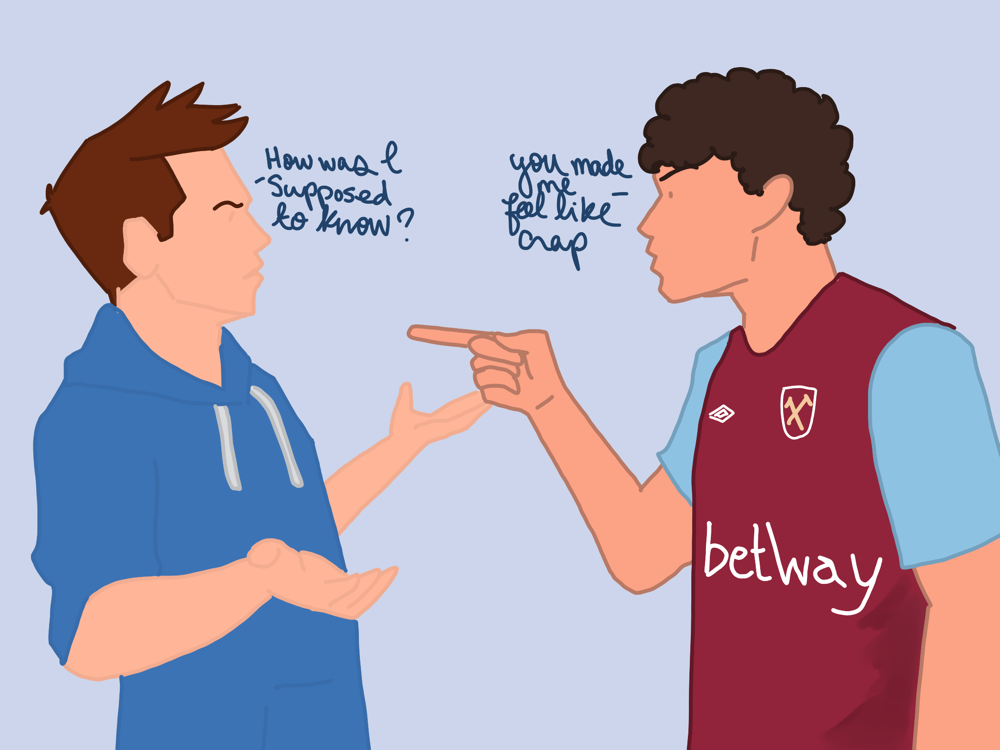Confrontation sucks. It’s awkward, uncomfortable, problematic and overall, just a nuisance in our lives. Sentences have to be perfectly curated to get the correct message across, but also not too demeaning in order to avoid the other person’s feelings being unnecessarily hurt. A calm composure and tone have to be maintained while anger and tears have to be tightly restrained.
Confrontation can be challenging simply because of its nature. You have to tackle and discuss a topic that can be uncomfortable and grueling for both parties to discuss. Confrontation, however, does not always include anger-inducing issues, but can simply be something that a friend or family member did that you didn’t like. Whether the topic is as small as someone always trying to copy your homework, or as personal as your partner being disloyal, confrontation can be a useful tool and one that can be extremely beneficial to master.
Confrontation in all kinds of relationships:
However scary and anxiety-inducing confrontation may be, it is a necessary skill to utilize during high school and one that can also carry over into one’s future when it comes to jobs, friendships and romantic relationships.
“If you have an issue [and] you don’t confront someone about it, if you don’t talk about it, it’s gonna boil up and explode eventually so I think it is important to talk things [through]. Communication is key especially in [all] kinds of relationships,” senior Amelia Mason said.
In professional relationships, confrontation and being able to talk about how one feels in space is necessary, for both the person being affected and those around them. While many may believe that discussing issues in the workplace can seem unprofessional, it can oftentimes be the opposite. It allows hire-ups to be aware of issues, take steps to fix them and showcase one’s desire to improve the company.
“I would assume that [avoiding direct confrontation] happens in professional settings, so instead of bringing up conflict face-to-face, they complain to their coworkers about it and it kinda reminds me of high school. I think a better solution would be to discuss it face-to-face in most situations,” junior Sasha Rappaport said.
When it comes to confrontation with friends, these can be some of the most difficult conversations to have. Since friendships are relationships where all parties feel comfortable being themselves, confronting a person about one of their act(ion)s can be difficult. During these conversations, it’s vital to maintain a tone and include word choice that does not play the blame game, since it can make the other person feel attacked.
“In terms of confrontation, I think there is a certain way to come at it, so you can’t be very accusatory because I think that could also [lead to] some bad blood. I agree with confrontation but in a nice way,” Mason said.
Communication in relationships is also extremely important. It can sometimes be the deciding factor between staying together or breaking up. Relationship communication can be particularly tricky since it requires both parties to be open to communicating and finding a solution.
“Whenever something is wrong with my boyfriend, I say ‘A, B, C happened, how do we fix this, how do we move on from this.’ I don’t like leaving things [unfinished] because then you just don’t know what’s going on,” sophomore Moryah Cohen said.
The issue with texting:
A recent issue with confrontation is the ability to text, instead of talk face-to-face, about one’s concerns. While texting can provide us with the ability to connect with others at all times of the day, it can also make difficult conversations harder to understand.
“I think [texting] creates a lot more misunderstandings so when you are talking face-to-face, you [can] read their body language, you understand their tone, and I feel like all of that is gone when you’re texting someone. So a lot of things that they say could be taken out of context or misinterpreted to be mean. So I think it’s hard to confront someone and get your point across correctly on text,” Mason said.
The message “don’t apologize” can have very different meanings on text. It can be read as ‘don’t apologize, just continue upsetting me’ or it can be read as ‘it’s totally fine, don’t apologize about it.” These miscommunications can be fixed by simply communicating in person.
Tips and tricks:
Confrontation and communication are beneficial life skills, however, they can sometimes be difficult to master. Here are a few tips to help:
- Get comfortable with confrontation: Before you confront someone, understand that your feelings are valid and that you have a right to express how you feel toward someone’s actions.
- Plan out what you are going to say: It is critical that you have a full understanding of the issue at hand, that you have a few examples of the issue occurring and an overall plan about how you are going to express the issue. It may be helpful to write out your main points or even write a couple of sentences you want to say (at the end of the day, what else is the Notes app supposed to be used for?)
- Attack the issue, not the person: Ensure that you are addressing the issue at hand, such as a specific act or a tendency of the other person, not attacking their characteristics such as their gender, age or family situation.
- Listen critically and empathize with the other person: In a situation like this, it’s critical to truly listen to what the confronted has to say, instead of just shrugging it off. Try to understand their situation, perspective and reasoning behind their actions.
Communication is how relationships have the potential to thrive. Whether these discussions feature questions such as if a hotdog is considered a sandwich, what Jared McCain is doing or how one acts, all types of communication are beneficial and necessary for healthy relationships between friends, family and significant others.




































